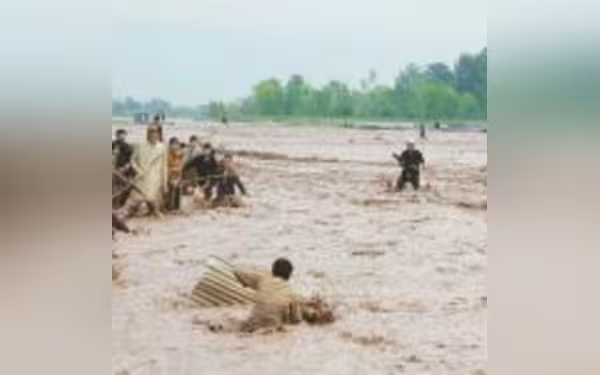Tuesday, July 2, 2024 03:11 PM
Dr. Muhammad Imran Urges Action on Pakistan's Environmental Challenges
- Urgent need for concrete steps to combat climate change
- Importance of environmental justice in all climate change efforts
- Critical role of civilian institutional leadership in addressing environmental issues
 Image Credits: pakobserver
Image Credits: pakobserverDr. Muhammad Imran stresses urgent action needed in Pakistan to combat environmental challenges, highlighting the importance of environmental justice and institutional leadership in addressing climate change effectively.
Pakistan is currently facing significant environmental challenges that require urgent attention, as highlighted by climate communication researcher Dr. Muhammad Imran. With World Environment Day approaching on June 5, the global focus this year is on 'Land restoration, stopping desertification, and building drought resilience.' The country is grappling with issues such as smog, floods, and extreme temperatures, which are severely impacting daily life and posing a threat to survival.
Dr. Imran has emphasized the need to go beyond ineffective measures like school closures and brochure distribution in tackling recurring problems like smog and heatwaves. It is crucial to move from words to actions in the fight against climate change. Mere policy documents and statements from the NDMA are insufficient unless they translate into practical steps for communities.
There is a critical necessity for Pakistan to clearly outline the roles of institutions in climate action, establish specific objectives, and develop comprehensive plans for assessment and accountability. Dr. Imran has underscored the importance of civilian institutional leadership that can be held responsible for their actions or inaction in addressing environmental issues.
The recent IPCC report has issued a stark warning about the urgency of the situation, indicating that certain regions in Pakistan could become uninhabitable without immediate action. These regions are often inhabited by marginalized and impoverished communities, highlighting the significance of environmental justice in all climate change efforts.
Marginalized communities bear the disproportionate burden of environmental degradation, facing the impacts of pollution, floods, and other disasters. Dr. Imran has stressed that neglecting climate change not only exacerbates existing inequalities but also increases vulnerabilities across society.
It is imperative for Pakistan to take concrete steps to address its environmental challenges and combat climate change effectively. By defining clear roles for institutions, setting specific objectives, and holding leaders accountable, the country can work towards a more sustainable future. Environmental justice must be at the forefront of all initiatives to ensure that marginalized communities are not left behind. The time to act is now to secure a healthier and safer environment for all.













